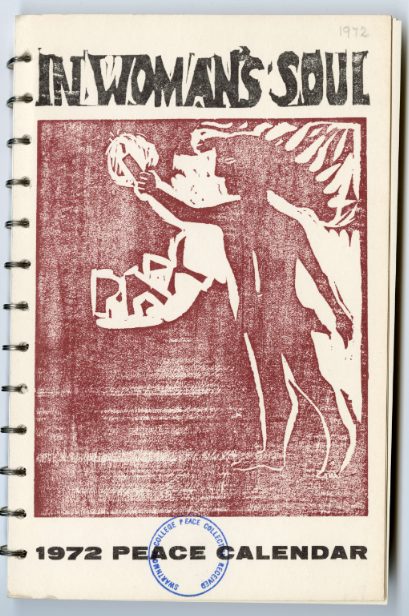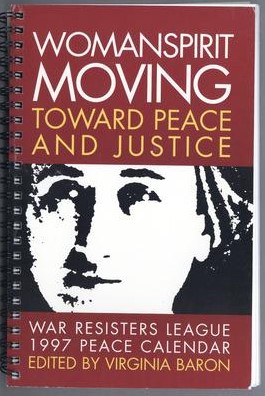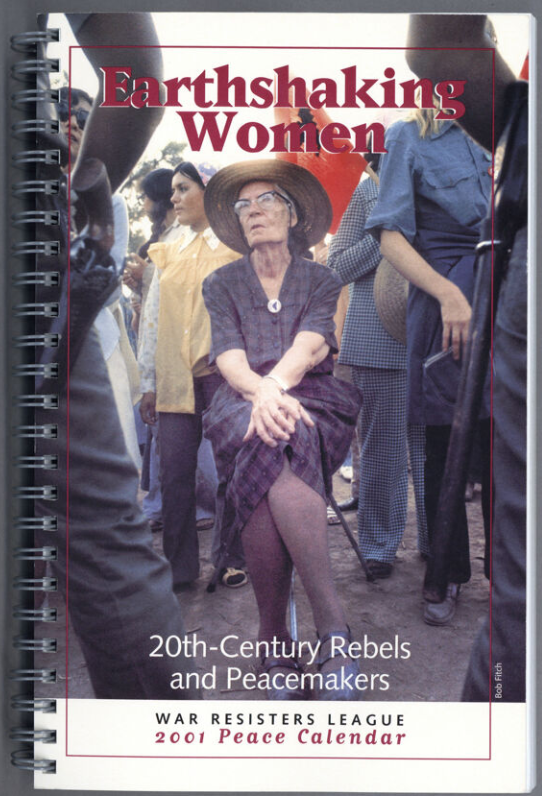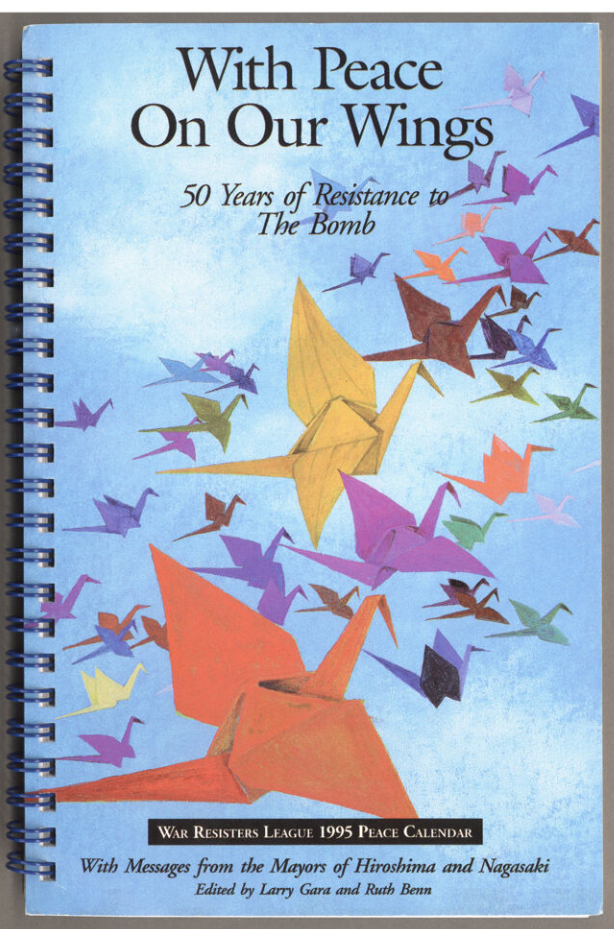
With the second wave of feminism gaining wide acceptance by social change organizations, WRL leaders decided that it, at last, needed to codify the accomplishments of pacifist women. Thus the organization’s 1972 peace calendar, In Woman’s Soul, whose title was taken from Emma Goldman’s pronouncement that women’s emancipation begins in their soul, was devoted to the writings and artwork of women antiwar activists.
 Reflecting the tenets of the women’s movement that eschewed individualism, a group, myself included, formed a collective to research the calendar’s contents, opting not to identify an editor. The calendar gave a platform to women, frequently unheard, speaking up, resisting, and embodying nonviolence by working to end slavery and other types of oppression, and the many wars that defined the history of too many countries. Dorothy Day, founder of the Catholic Worker movement, was quoted: “Silence means consent, and we cannot consent to the militarization of our country without protest.” A quote from Bernadette Devlin, a militant defender of Irish rights, went further: Women had to rise “to build up a disciplined, nonviolent force.” Contributors to the text ranged from the well-known (Joan Baez) to the mother (Louise Bruyn) who walked from Massachusetts to Washington DC to protest the war in Vietnam. The artwork—photos, drawings, paintings— gave exposure to artists also underrecognized, and represented Lucia Vernarelli’s statement: “[We] women artists have dared to cultivate the exotic old-fashioned virtues of human feelings, human values, and human scale.”
Reflecting the tenets of the women’s movement that eschewed individualism, a group, myself included, formed a collective to research the calendar’s contents, opting not to identify an editor. The calendar gave a platform to women, frequently unheard, speaking up, resisting, and embodying nonviolence by working to end slavery and other types of oppression, and the many wars that defined the history of too many countries. Dorothy Day, founder of the Catholic Worker movement, was quoted: “Silence means consent, and we cannot consent to the militarization of our country without protest.” A quote from Bernadette Devlin, a militant defender of Irish rights, went further: Women had to rise “to build up a disciplined, nonviolent force.” Contributors to the text ranged from the well-known (Joan Baez) to the mother (Louise Bruyn) who walked from Massachusetts to Washington DC to protest the war in Vietnam. The artwork—photos, drawings, paintings— gave exposure to artists also underrecognized, and represented Lucia Vernarelli’s statement: “[We] women artists have dared to cultivate the exotic old-fashioned virtues of human feelings, human values, and human scale.”
 WRL produced the next calendar focused solely on women 25 years later: Womanspirit Moving Toward Peace and Justice (1997). Noting that it might seem that not much had changed for women activists in the last quarter century, the calendar’s editor, Virginia Baron, however, wrote “…[I]t does appear that women, at least in the West, no longer question their role…as full participants in the ongoing process of shaping a more just society.” The calendar comprised first-person accounts women’s actions and organizations, demonstrating that wherever there are wars and oppression there are women to resist that evil: Central and South America, Africa, East Europe, Southeast Asia, the Middle East. Sadly, some of the entries, describing resistance activities decades ago are still needed today: a women’s encampment in 1996 to protest Russia’s occupation in the Chechen Republic; the Women in Black group of Israelis protesting Israel’s occupation of Palestine at intersections in Jerusalem, Tel Aviv, and Haifa.
WRL produced the next calendar focused solely on women 25 years later: Womanspirit Moving Toward Peace and Justice (1997). Noting that it might seem that not much had changed for women activists in the last quarter century, the calendar’s editor, Virginia Baron, however, wrote “…[I]t does appear that women, at least in the West, no longer question their role…as full participants in the ongoing process of shaping a more just society.” The calendar comprised first-person accounts women’s actions and organizations, demonstrating that wherever there are wars and oppression there are women to resist that evil: Central and South America, Africa, East Europe, Southeast Asia, the Middle East. Sadly, some of the entries, describing resistance activities decades ago are still needed today: a women’s encampment in 1996 to protest Russia’s occupation in the Chechen Republic; the Women in Black group of Israelis protesting Israel’s occupation of Palestine at intersections in Jerusalem, Tel Aviv, and Haifa.
 The third peace calendar, Earthshaking Women (2001), also has an international focus but features individual women activists as opposed to their organizations. One notable little-known activist profiled is Sarojini Naidu, who took over the Anti-Salt Campaign in 1930 when Gandhi was imprisoned. Another is Ngo Ba Thanh, a “third force” activist in Vietnam who went on a hunger strike when jailed by the South Vietnamese for her peace work. Among the women representing the U.S. is Jeannette Rankin, the only member of Congress to vote against U.S. entry into both world wars. In 1968, at age 88, she organized the 5,000-women Jeannette Rankin Brigade in Washington DC to protest the war in Vietnam.
The third peace calendar, Earthshaking Women (2001), also has an international focus but features individual women activists as opposed to their organizations. One notable little-known activist profiled is Sarojini Naidu, who took over the Anti-Salt Campaign in 1930 when Gandhi was imprisoned. Another is Ngo Ba Thanh, a “third force” activist in Vietnam who went on a hunger strike when jailed by the South Vietnamese for her peace work. Among the women representing the U.S. is Jeannette Rankin, the only member of Congress to vote against U.S. entry into both world wars. In 1968, at age 88, she organized the 5,000-women Jeannette Rankin Brigade in Washington DC to protest the war in Vietnam.
Other calendars with different themes include accounts by and about women. They also present art by talented longtime WRL members Vera B. Williams, Peg Averill, and Erika Weihs.
 Among them is With Peace on our Wings: Fifty Years of Resistance to the Bomb (1995), which includes an account of the Women’s Pentagon Action, which melded nonviolence and feminism and organized a 1981 action where 2,000 women, with 140 arrested, encircled the Pentagon and wove a web of yarn through the demonstrators.
Among them is With Peace on our Wings: Fifty Years of Resistance to the Bomb (1995), which includes an account of the Women’s Pentagon Action, which melded nonviolence and feminism and organized a 1981 action where 2,000 women, with 140 arrested, encircled the Pentagon and wove a web of yarn through the demonstrators.
In While there is a Soul in Prison: Statements on the Prison Experience (1979), Living Theatre founder Judith Malina wrote about the particular vulnerability of women, calling jails “the terminal station of the patriarchal rigidity." A Matter of Freedom: Writings by Activists for Activists (1988) presented longtime tax resister Juanita Nelson’s wonderful essay about her need to commit civil disobedience, which provided the calendar’s title.
Salaam, Shalom, Solh: Nonviolence and Resistance in the Middle East and Beyond (2008) highlights Bat Shalom, an organization of Jewish and Palestinian Israeli women working together for a genuine peace grounded in a just resolution of the Israel-Palestine conflict, respect for human rights, and an equal voice for Jewish and Arab women within Israeli society, Founded in 1989, the group is still active today.
The calendar entries that present women’s contributions to the peace and social justice movement help redress too frequent erasure from radical history. Still, there were many decades when women toiled in anonymity—considered simply extensions of an organization’s typewriters—so the full story of women’s progressive activism is yet to be told.
--Wendy Schwartz
An activist with WRL for over 50 years focused on the role of women in the organization and everywhere, Wendy Schwartz is proud to have crafted WRL's statement on freedom of choice.
WRL’s permanent repository at The Swarthmore College Peace Collection contains a set of WRL peace calendars, recently digitized and made available online as part of The War Resisters League Publications Digital Collection. This blog is part of a series of blog posts focusing on the WRL peace calendars to be published during 2024.





